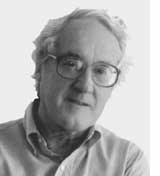 |

Friday Evening Lecture Series
 07/25/03 (Glassman Lecture) 07/25/03 (Glassman Lecture)
Addressing the Threat of Anthrax
R. John Collier, Department of Microbiology and Molecular Genetics, Harvard Medical School
Introduction by Gerald Weissmann, M.D., Professor of Medicine and Director of the Biotechnology Study Center at the New York University School of Medicine
Lecture Abstract:
The anthrax attacks in the fall of 2001 prompted the nation to embark on an effort to develop countermeasures against this and other biological warfare agents. Where do we stand in our quest to address the threat of anthrax? Recent studies on the structure and mode of action of the toxin produced by the bacteria, which is responsible for the main symptoms of the disease, have led to new approaches to therapy and vaccination. In addition, novel ways of attacking and destroying the invading bacteria are being developed. After summarizing relevant progress on the scientific front, I will discuss some of the larger questions we as a society face in undertaking scientific research to protect ourselves against bioterrorism.
R. John Collier received a B.A. in Biology from Rice University in 1959 and a Ph.D. from Harvard University in 1964. After postdoctoral study at the University of Geneva, Switzerland, he joined the faculty at the University of California, Los Angeles in 1966 and progressed through the ranks to Professor. In 1984 he moved to the Harvard Medical School where he became Professor in the Department of Microbiology and Molecular Genetics. From1988 to1995, Dr. Collier served as the Faculty Dean for Graduate Education and Chairman of the Division of Medical Sciences. In 1991 he was elected to membership in the National Academy of Sciences and in 1993 became a Fellow of the American Academy of Arts and Sciences. In 1998 he was featured in Microbiology, a Centenary Perspective, a compilation of 100 landmark research articles in microbiology over the past century, and in 1999 was awarded the Selman A. Waksman Award in Microbiology by the National Academy of Sciences. In addition, Dr. Collier was Associate Editor of Protein Science from 1995 to 2001. He served as a Member of the National Academy of Sciences Committee on the US-Russian Collaborative Program for Research and Monitoring of Pathogens of Global Importance from 1997-2000 and on the Boards of Governors of the American Academy of Microbiology from 1997 to 2003. Dr. Collier was also a member of the NIAID Blue Ribbon Panel on Bioterrorism in 2002.
Gerald Weissmann, M.D. was born in Vienna, Austria. He received a B.A. from Columbia University in 1950 and his M.D. from New York University (NYU) School of Medicine in 1954. He is currently a Professor of Medicine and Director of the New York University School of Medicine's Biotechnology Study Center. From 1973 to 2000, he served as Director of NYU School of Medicine's Division of Rheumatology. Dr. Weissmann is on the Advisory Board of the Ellison Medical Foundation and now manages the Rockefeller Foundation's "Undeveloped Drug Project." He was Co-Founder (with E.C. Whitehead) and a Director of The Liposome Company in Princeton, NJ from 1982 to 2000. Dr. Weissmann has a longtime association with the MBL. He is a former investigator and instructor in the Physiology course and is currently an MBL Trustee in the Class of 2005. A former president of the Harvey Society and the American College of Rheumatology, he is a Fellow of the AAAS and the New York Academy of Sciences. He was elected to the Accademia Nazionale dei Lincei (Rome) in 2002. Some of the honors and awards Dr. Weissmann has received include the Paul Klemperer Medal, New York Academy of Medicine in 1997; Liposome Research Award 1994, the Distinguished Investigator Award from the American College of Rheumatology in 1992; the MBL Centennial Award (with James Wyngaarden and DeWitt Stetten, Jr.) in 1988; the Lila Gruber Cancer Research award (with Emil Frei, III) in 1979; and the Alessandro Robecchi International Prize for Rheumatology in 1972. His seven books of essays range from "The Woods Hole Cantata" (1985) to "The Year of the Genome (2002). Dr. Weissmann lives in New York and has a home in Woods Hole.
About the Glassman Lecture
The Glassman Lecture is held in honor of the late Harold N. Glassman who left a generous bequest to the MBL which resulted in the establishment of the Harold N. Glassman fund, the income from which is used to support an annual Friday Evening Lecture on an important topic in biological research.
|